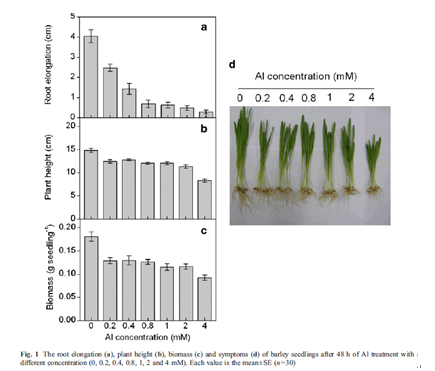Juan Chen, Wen-Hua Wang, Fei-Hua Wu, Chun-Yan
You, Ting-Wu Liu, Xue-Jun Dong, Jun-Xian He, Hai-Lei Zheng Pennings.Plant
Soil,2013.362: 301–318.
Aims Aluminum (Al) toxicity is one of themajor factorsthat limit
plant growth. Low concentration of hydrogensulfide (H2S) has been proven to
function in physiologicalresponses to various stresses. The objective of
thisstudy is to investigate the possible role of H2S in Altoxicity in barley (Hordeum
vulgare L) seedlings.Methods Barley seedlings pre-treated with
sodiumhydrosulfide (NaHS), a H2S donor, and subsequentlyexposed to Al treatment
were studied for their effectson root elongation, Al accumulation in seedlings,
Alinducedcitrate secretion and oxidative stress, andplasma membrane (PM)
H+-ATPase expression.Results Our results showed that H2S had significantrescue
effects on Al-induced inhibition of root elongationwhich was correlated well
with the decrease ofAl accumulation in seedlings. Meanwhile, Al-inducedcitrate
secretion was also significantly enhanced byNaHS pretreatment. Al-induced
oxidative stress asindicated by lipid peroxidation and reactive oxygenspecies
burst was alleviated by H2S through the activationof the antioxidant system. Moreover,
Alinducedreduction in PM H+-ATPase expression wasreversed by
exogenous NaHS.Conclusions Altogether, our results suggest H2S
playsan ameliorative role in protecting plants against Altoxicity by inducing
the activities of antioxidantenzymes, increasing citrate secretion and citrate
transportergene expression, and enhancing the expressionof PM H+-ATPase.

返回

